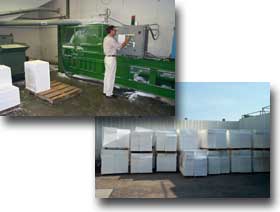|
|
|
The Environmental Role of Packaging
Cushion protective packaging has an important environmental role - to reduce damage and breakage to manufactured products. Broken, unuseable products end up in landfills, which are rapidly filling up. Products damaged in shipment need to be remanufactured. Additional raw materials are used to replace them. More fossil fuels have to be burned, creating carbon dioxides and sulfur dioxides that pollute our environment.
Very little energy is used to produce cushion packaging, but it protects many valuable products that require high energy to manufacture. By giving optimum damage protection, CushPack reduces the need to remanufacture and reship. By reducing product damage, CushPack saves resources.
Cushion packaging makes the product journey safer.

Facts about product distribution.
- 4,000,000 miles of highway - 800,000 miles are obsolete, 25% need repair
- Average product hauling distance by trucks is 280 miles
- Product damage estimate annually - $100 million to $10 billion
- Transport product damage is responsible for warranty, service and product safety problems.
EPS Cushion Packaging
 Recycling
Recycling
EPS is 100 percent recyclable, and can be recycled in various ways. The rigid product can be mechanically broken apart, making a lightweight, granular product that has many uses. EPS is also thermally processed to make a resin that is used in a number of valuable products for use in homes, schools and offices.

Additional Environmental Benefits:
- No CFCs - EPS has never been made with any CFC, HCFC, or HFC gases. CFCs have been shown to be harmful to the earth's ozone layer.
- Landfill Safe - EPS is inert and stable. It will not leach out toxic chemicals, heavy metals or create dangerous decomposition gases such as methane, a "greenhouse" type gas. In landfills, EPS helps to keep the ground stable, important when the area is reclaimed for development.
- Waste to Energy Safe - EPs provides a clean source for WTE inceneration systems. The simple chemical make-up of EPS is carbon and hydrogen, elements found in wood and other organic materials. EPS ash is therefore non-toxic - no unsafe chemicals or heavy metals are produced when burned as a fuel.
CushPack is committed to providing the highest quality products and services. We're proud of our recycling achievements and are committed to work harder for the protection of our environment.
To learn more about the environmental impact of EPS packaging, please refer to Concerned for the Future - EPS Packaging brochure.
|
|
|
|
|